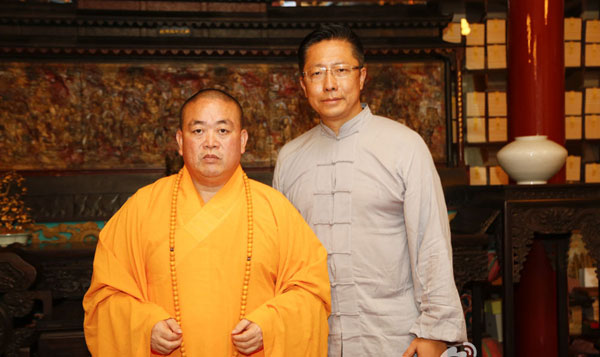

 |
|
Li Yang (right) became a layman disciple of Shi Yongxin, monastery head of the Shaolin Temple in central China's Henan province. Provided to China Daily |
Move provokes a wave of criticism from netizens, who call it a 'marketing gimmick'.
Li Yang has converted to Buddhism at a renowned Buddhist temple following a domestic violence scandal that put the creator of the "Crazy English" method of language learning at the center of controversy.
Li became a layman disciple of Shi Yongxin, head of the Shaolin Temple in central China's Henan province, shortly after the two had an arranged meeting on Saturday morning, Shi told Xinhua News Agency on Tuesday.
Now using the Buddhist name "Yanyi", Li confirmed the news on Tuesday morning on Sina Weibo, the Chinese equivalent of Twitter. The 45-year-old celebrity educator said he became a layman Buddhist because he "hopes to spread Chinese culture with the English language".
In a long post on Sina Weibo, Li said he plans to build the world's biggest kung fu and language training center in Dengfeng City, where the Shaolin Temple is located. He also plans to hold an international English winter camp at the temple in 2015.
"Crazy English", a non-traditional teaching method that uses shouting to help students memorize and practice the language, has been hugely successful since it was founded in the early 1990s.
However, in August 2011, Li's then-wife, Kim Lee, accused him of beating her, and posted pictures of her injuries on the Internet.
A week later, after the case had triggered a wave of condemnation, Li apologized, but was adamant that "it was just a quarrel between a couple".
In February 2013, a Beijing court granted a divorce on the grounds of domestic abuse.
Li's conversion to Buddhism has drawn scathing comments from Chinese netizens.
"Maybe Li Yang will use Shaolin kung fu to beat his wife in the future," one speculated.
"This is probably another marketing gimmick to sell more of his 'Crazy English' books that are seeing disappointing sales," wrote another.
Shi said he didn't know much about Li's background, but that "the past is in the past."
The high-profile monk, who has courted controversy for developing money-spinning business operations such as kung fu shows, added that Li's conversion to Buddhism is "praiseworthy", and that the Shaolin Temple welcomes anyone who wishes to become a layman disciple.
It's not rare for Chinese celebrities to convert to Buddhism: Singer Faye Wong and actor Andy Lau are among scores of famous people who have become disciples.